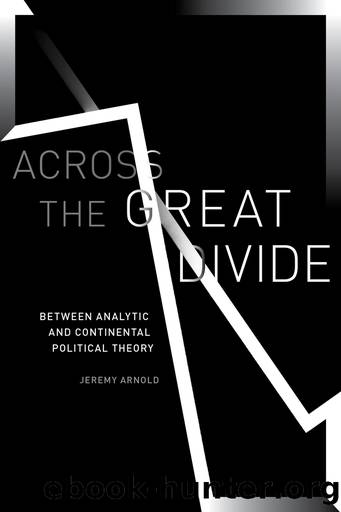Across the Great Divide by Jeremy Arnold;

Author:Jeremy Arnold; [Arnold, Jeremy]
Language: eng
Format: epub
Publisher: Stanford University Press
Published: 2020-06-15T00:00:00+00:00
5
RAWLS AND DERRIDA ON JUSTICE
HEGEL REMARKED THAT âquite generally, the familiar, just because it is familiar, is not cognitively understoodâ (Hegel 1977, §31). The work of John Rawls is an exception. Few books of political philosophy are as widely read and well understood as A Theory of Justice (hereafter TJ), Political Liberalism (hereafter PL), and Justice as Fairness (hereafter JaF). Whatever difficulties there may be in Rawlsâ arguments, understanding them is not one of them. An apt example of Hegelâs general rule is the work of Jacques Derrida. The difficulty of Derridaâs proseâor willful obscurity, as his critics would have itâhas led to a number of plausible competing interpretations of his philosophical project as well as a number of outright rejections based, seemingly, on little more than hearsay from contemptuous philosophers. Derrida, like Rawls, has been discussed at length throughout the humanitiesâwith the exception of analytic philosophy. While a few philosophers within or sympathetic to analytic philosophy have engaged Derridaâs work on language and/or philosophy generallyâJohn Searle, Stanley Cavell, Richard Rorty, Samuel Wheeler, and Henry Staten come to mindâDerridaâs ethical and political writings are almost entirely ignored by contemporary analytic political philosophers. Derrida is acknowledged, if at all, only implicitly in rejections of nihilism, postmodernism, relativism, and other bogeys. For many political philosophers, to the extent that Derrida is familiar, he is for that reason not understood.1
This chapter explores Rawlsâ and Derridaâs accounts of the concept and conceptions of justice because when read together Rawls and Derrida expose a deep difficulty in modern political thought: can we proceed without metaphysics in political theorizing? This question has been asked many times before, and often answered with a âno.â Alasdair MacIntyre argues that âwe still, in spite of the efforts of three centuries of moral philosophy and sociology, lack any coherent rationally defensible statement of a liberal individualist point of view,â while âon the other hand, the Aristotelian tradition can be restated in a way that restores intelligibility and rationality to our moral and social attitudes and commitmentsâ (MacIntyre 1984, 259). For MacIntyre, only a revised classical metaphysics can restore ethical coherence to modernity. William Connolly argues against the secularist hope for religious and metaphysical neutrality, arguing that there is no escaping difficult questions of ontology, faith, metaphysics, and religion, whether we are theists or not (see Connolly 1995; 2000; 2005; 2008). Many communitarians claim that justice, rights, freedom, and the like, only make sense given substantive moral commitments embedded in specific forms of life, most of which rely on rich ideas about the self, the world, the divine, and so on. And yet, many liberals, both classical and contemporary, as well as various other political thinkers, have tried to do without recourse to metaphysics, ontology, or theology.
Rawls and Derrida navigate this debate in similar ways, albeit from opposite directions: they both try to articulate a âpost-metaphysicalâ conception of justice by embedding justice in the specific legal and political history of the West. The central innovation in Rawlsâ view from TJ to
Download
This site does not store any files on its server. We only index and link to content provided by other sites. Please contact the content providers to delete copyright contents if any and email us, we'll remove relevant links or contents immediately.
The remains of the day by Kazuo Ishiguro(9000)
Tools of Titans by Timothy Ferriss(8398)
Giovanni's Room by James Baldwin(7347)
The Black Swan by Nassim Nicholas Taleb(7132)
Inner Engineering: A Yogi's Guide to Joy by Sadhguru(6797)
The Way of Zen by Alan W. Watts(6615)
The Power of Now: A Guide to Spiritual Enlightenment by Eckhart Tolle(5785)
Asking the Right Questions: A Guide to Critical Thinking by M. Neil Browne & Stuart M. Keeley(5776)
The Six Wives Of Henry VIII (WOMEN IN HISTORY) by Fraser Antonia(5516)
Astrophysics for People in a Hurry by Neil DeGrasse Tyson(5191)
Housekeeping by Marilynne Robinson(4449)
12 Rules for Life by Jordan B. Peterson(4307)
Ikigai by Héctor García & Francesc Miralles(4275)
Double Down (Diary of a Wimpy Kid Book 11) by Jeff Kinney(4273)
The Ethical Slut by Janet W. Hardy(4258)
Skin in the Game by Nassim Nicholas Taleb(4250)
The Art of Happiness by The Dalai Lama(4130)
Skin in the Game: Hidden Asymmetries in Daily Life by Nassim Nicholas Taleb(4007)
Walking by Henry David Thoreau(3963)
